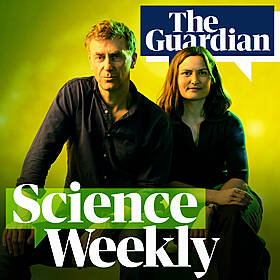
What is ‘mirror life’ and why are scientists sounding the alarm?
13 February - 17 minsRecently, a group of world-leading scientists called for a halt on research to create ‘mirror life’ microbes amid concerns that the synthetic organisms would present an ‘unprecedented risk’ to life on Earth. Ian Sample tells Madeleine Finlay about why this work initially seemed exciting for scientists and what the risks of it continuing could be. And Kate Adamala, assistant professor of genetics, cell biology and development at the University of Minnesota, describes what made her change her mind about pursuing her own research on mirror cells. Help support our independent journalism at theguardian.com/sciencepod

Summer picks: The science of racism, and how to fight it
In this episode from January 2025, Ian Sample speaks to Keon West, a professor of social psychology at the University of London, whose new book explores what science can reveal about racism, the inventive methods scientists have used to study it and the scientifically proven ways of tackling racism and discrimination. Help support our independent journalism at theguardian.com/sciencepod
19 mins
31 July Finished

Summer picks: Where did our attention spans go, and can we get them back?
In 2024, the Oxford English Dictionary announced its word of the year was ‘brain rot’. The term relates to the supposedly negative effects of consuming social media content, but it struck a chord more widely with many who feel they don’t have the mental capacity they once had. Gloria Mark, a professor of informatics at the University of California, Irvine, has been studying our waning attention spans for 20 years. In this episode from January 2025, she tells Madeleine Finlay why she believes our powers of concentration are not beyond rescue, and reveals her top tips for finding focus. Help support our independent journalism at theguardian.com/sciencepod
17 mins
29 July Finished

Why do we age in dramatic bursts, and what can we do about it?
Scientists are beginning to understand that ageing is not a simply linear process. Instead, recent research appears to show that we age in three accelerated bursts; at about 40, 60 and 80 years old. To find out what might be going on, Ian Sample hears from Prof Michael Snyder, the director of the Center for Genomics and Personalised Medicine at Stanford University School of Medicine, who explains what the drivers of these bursts of ageing could be, and how they might be counteracted. Help support our independent journalism at theguardian.com/sciencepod
14 mins
24 July Finished

The babies born with DNA from three parents
Doctors in the UK have announced the birth of eight healthy babies after performing a groundbreaking procedure that creates IVF embryos with DNA from three people. Ian Sample tells Madeleine Finlay about the life-threatening genetic disorders that the technique appears to prevent, and Prof Sir Doug Turnbull describes the 25-year journey to achieving the breakthrough. Help support our independent journalism at theguardian.com/sciencepod
17 mins
22 July Finished

Two black holes collide, lab-grown organs, world’s first climate visa
Madeleine Finlay is joined by Ian Sample to discuss three intriguing science and environment stories. From a breakthrough in the quest to create organs in the lab to a world-first climate visa that will see citizens relocate from the island of Tuvalu to Australia, plus what happens when two massive black holes collide. Help support our independent journalism at theguardian.com/sciencepod
21 mins
17 July Finished

Why are parents using melatonin to help their kids sleep?
Guardian feature writer Rhiannon Lucy Cosslett recently wrote about the growing cohort of parents whose children are on the waiting list for an autism or ADHD diagnosis, and are turning to the internet to buy melatonin to help them sleep. She tells Madeleine Finlay about their experiences and what is driving them to the hidden market. Paul Gringras, a consultant in paediatric sleep medicine and neurodisability, and lead of sleep medicine at King’s College London, also explains why melatonin can be helpful for neurodivergent children and why he is concerned about the increasing number of parents looking for it online. Help support our independent journalism at theguardian.com/sciencepod
17 mins
15 July Finished





















